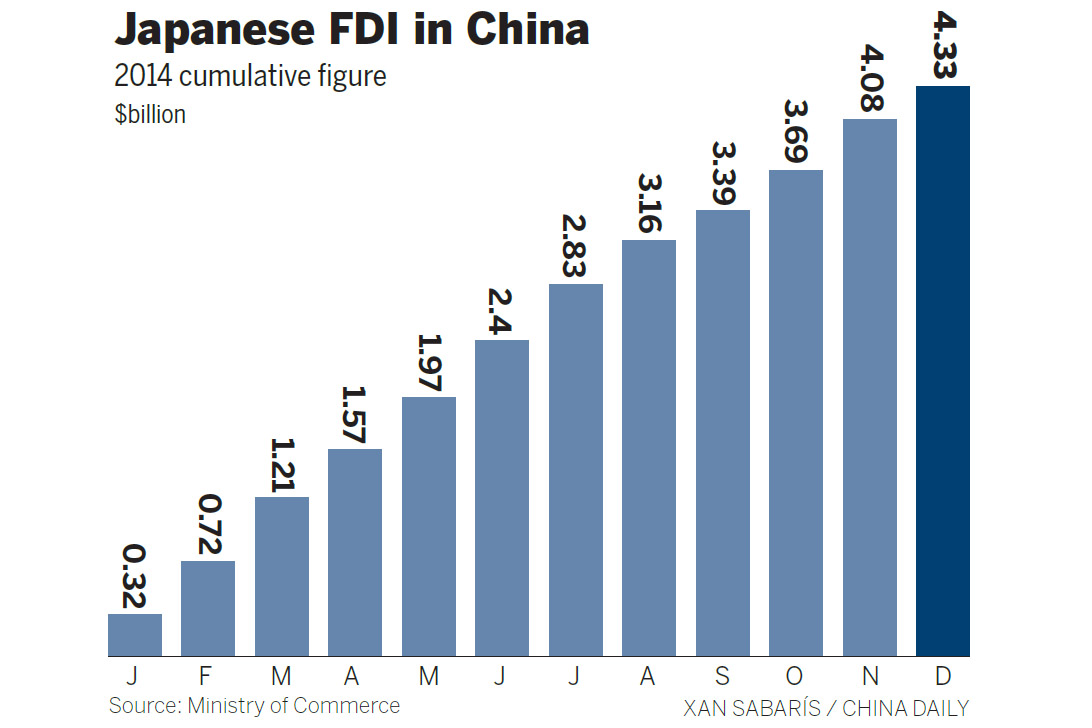
Investment surges by 46.9 percent year-on-year in January
Japanese investment in China surged in January after months of decline last year.
The development indicates that the world’s third-largest economy continues to count on the Chinese market to put economic growth on a firmer footing amid growing domestic and international economic problems.
Japanese contracted investment in China rose by 46.9 percent year-on-year in January. The number of new enterprises set up by Japanese investment increased by 3.5 percent and actual investment rose by 3.2 percent, the Ministry of Commerce said on Feb 16.
At a news conference, the ministry did not provide a total amount for Japanese investment last month.
Shen Danyang, the ministry’s spokesman, said China’s high-quality labor force, developed infrastructure facilities, improved business environment and ongoing urbanization were the main factors that attracted increased Japanese investment in January.
Japan’s direct investment in China fell by 38.8 percent year-on-year in 2014 to $4.33 billion.
The decline, compared with a fall of about 4 percent in 2013, reflects soured bilateral relations over territorial and wartime historical issues, as well as rising operational costs in China.
Shen said, “The January growth trend will continue as China is diversifying its export channels through e-commerce trade platforms and favorable policies resulting from bilateral or multilateral free trade agreements.”
Zhao Zhongxiu, a trade professor at Beijing’s University of International Business and Economics, said China’s incoming investment last year rose generally at a time when global investment flows were less than robust.
“Japan is still confronting issues such as slow demand in the global market last year, inflation, labor shortages and a long-term financial deficit,” Zhao said.
“China will continue to remain a key investment area for Japan to seek new market growth points this year.”
China saw strong inflows of foreign investment in January despite slower economic growth, with services and high-end manufacturing luring investor interest.
The country gained $13.92 billion in foreign direct investment last month, an increase of 29.4 percent from a year earlier. Investment from South Korea, Sweden, Singapore, Germany and another six nations and regions accounted for 96.5 percent of China’s FDI in January.
The service sector accounted for two-thirds of inbound investments in January, while high-end manufacturing took up nearly all the remainder.
Domestic companies also showed growing interest in making offshore investments, with much of their attention focusing on Europe.
The ministry said it hasn’t seen Japanese companies withdrawing capital or human resources from China. Only a few companies from Japan reduced their investment in China last year due to management errors and weak market demand.
“As Chinese economic growth slowed and costs in many sectors continued to rise in recent years, it is understandable that many foreign companies shut down their manufacturing facilities or carried out merger and reorganization activities in China,” Zhao said.
Wei Jianguo, vice-chairman of the China Center for International Economic Exchanges, said, “That a few foreign companies leaving China is normal.”
Higher costs and wages may see some manufacturing companies leave, Wei said. But the boom in China’s industrial upgrading and restructuring will see its high-end manufacturing and service sectors flourish and attract more international investors.
